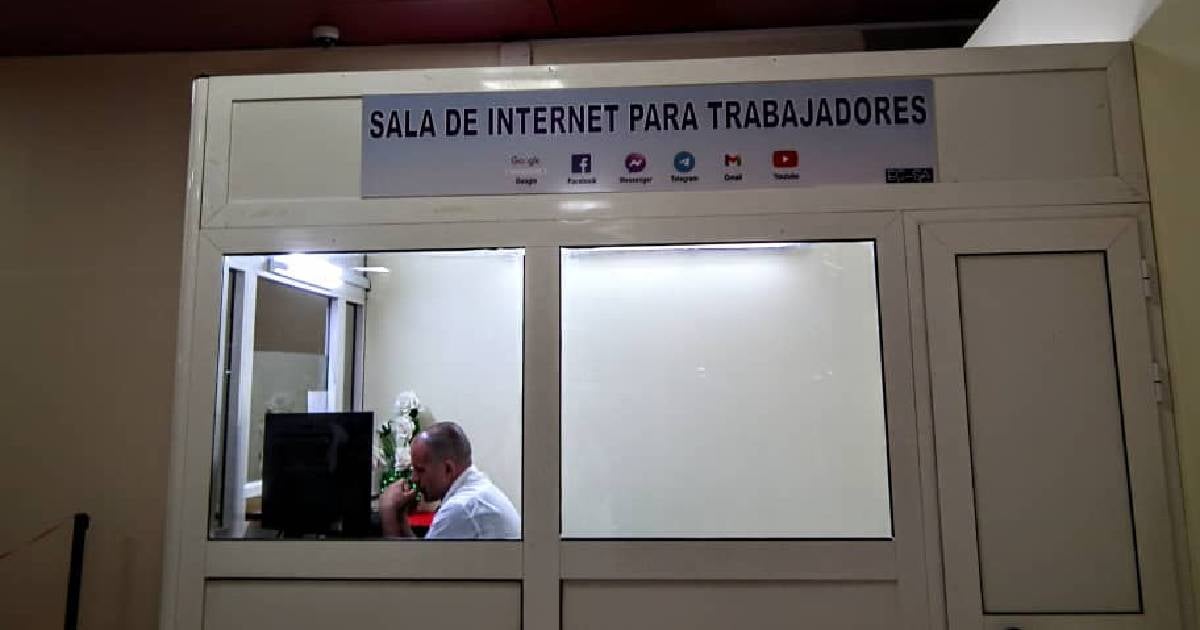The management of Juan Gualberto Gómez International Airport in Varadero inaugurated a free navigation room for its employees this Monday, in response to the unpopular rate increase announced by the state-run and sole telecommunications company in Cuba (ETECSA), which further raises the cost of internet access in the country.
The venue will allow “downloading information of interest,” as well as “consulting documents, tutorials, along with all the information options that the internet provides,” highlighted the official newspaper Girón.
Photo: Girón newspaper
True to the official fanfare, the inauguration took place “in a simple ceremony,” with the presence of singer-songwriter Israel Rojas, leader of the group Buena Fe. Interestingly, Rojas was one of the many citizen voices that criticized what he considers “communication vices” in the recent announcement by the telecommunications monopoly to dollarize its main mobile internet services.
Defending the regime, the musician took care not to directly criticize the measure, although he expressed in a social media comment that “the technical and objective reasons” behind the rate hike “even though undeniable, end up seeming uncertain, unjust, and erratic.”
The internet room will also benefit, with prior coordination, the residents of the Carbonera community, an area supported by the airport terminal. In that locality, according to the report from Girón, “countless constructive actions have been carried out for social entities” and “tailored attention has been provided to vulnerable children and families,” including projects such as the colorful Avioncito Children’s House, which is highlighted as an example of social impact.
During the event, workers expressed their gratitude for the opening of the service, highlighting its usefulness for “the training of young people who are still studying and veterans eager to enhance their education.”
Photo: Girón newspaper
But the underlying question remains: how many more centers will be able to do the same in a country where access to the Internet, instead of expanding, is increasingly confined within walls of prices, restrictions, and control?
The navigation room at the airport facility, seemingly commendable, highlights a broader reality: with official rates beyond the reach of many, the only option for accessing information and training in workplaces relies on local and exceptional initiatives like this one.
The neoliberal package from ETECSA restricts access to the internet for most Cubans, compelling them to rely on high-cost top-ups in CUP and dollars, well beyond the means of most citizens who earn their salaries in a heavily devalued Cuban peso, in the context of rampant inflation, once they exhaust the meager data package allowed for browsing in a month (just 6 GB).
The new tariff scheme of ETECSA has been deemed abusive and discriminatory by the vast majority of Cuban citizens and described as “a robbery at gunpoint.”
Facing a measure viewed not only as an act of social exclusion but also as a form of economic blackmail, many dignified Cubans have decided to reject any top-ups from abroad.
After the widespread popular backlash, ETECSA attempted to quell the criticism with new measures announced on the government program Mesa Redonda on the night of June 2, offering 12 GB for 720 CUP and access to free educational sites for university students.
However, this Tuesday, in an official statement, the FEU and the UJC of the “José Antonio Echeverría” Technological University of Havana (formerly CUJAE) not only requested alternatives to those offered, but also demanded more respect from ETECSA towards the people.
Frequently Asked Questions about ETECSA’s Rate Increase and Connectivity in CubaWhy has ETECSA increased internet rates in Cuba?
ETECSA has justified the increase in rates by the need to obtain foreign currency to sustain and develop the country’s technological infrastructure. However, these measures have been perceived as an attempt to dollarize mobile services, limiting access for those who can only pay in Cuban pesos.
What impact does the new tariff scheme of ETECSA have on the Cuban population?
The new pricing scheme from ETECSA severely restricts internet access for the majority of Cubans, who must pay in dollars or face a monthly cap on top-ups in Cuban pesos. This has led to widespread discontent, as many view the rates as exploitative and exclusive.
How has the population and the official media reacted to ETECSA’s rate hike?
The reaction has been one of widespread indignation, both among the public and in some official media. Cubans have expressed their discontent on social media and on official platforms like Cubadebate, while newspapers such as Girón have called for greater transparency and sensitivity from ETECSA.
What measures has ETECSA taken to mitigate discontent over the increase in rates?
Following the widespread rejection, ETECSA has announced measures such as increasing the data allowances for some packages and providing free access to educational sites for students. However, these actions have been viewed as insufficient, as the main problem lies in the high costs and the exclusion created by the new rates.
